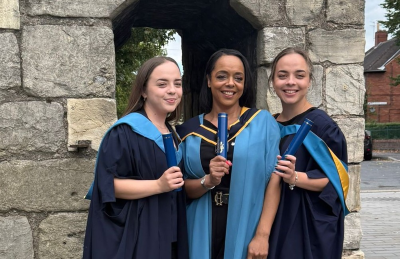All news and blog posts

Centre for Protecting Women Online at The Open University responds to Government’s VAWG Strategy
The Centre welcomed the Government’s focus on online abuse in its VAWG Strategy but warned it treats digital abuse as secondary and relies too much on tech firms to self-regulate. It also flagged gaps in addressing adult women and racialised communities, calling for stronger accountability.

Parental child abduction: why extending criminalisation is not the answer
Allison Wolfreys, Lecturer in Law at OULS, examines a proposed crime and policing bill that would make failing to return a child after a holiday a criminal offence, carrying a potential prison sentence of up to seven years.

Triple Triumph: Mum and twin daughters graduate together from same university
There was no mistaking the joy on the faces of Sarah Chappell and her twin daughters Megan and Abbey Douglas-Chappell when all three donned cap and gowns and celebrated their graduation from The Open University recently.

OU leads research on Scotland’s Fair Access landscape
A team of researchers from The Open University has been appointed to lead a new national project mapping Scotland’s Fair Access landscape.

Discover the human side of space exploration in new OU / BBC programme
A new four-part OU/BBC series, Once Upon a Time in Space, begins on BBC Two and iPlayer at 9pm today (Monday 27 October).

Centre for Protecting Women Online Concludes Inaugural Annual Conference at The Open University
The Centre for Protecting Women Online (CPWO) held its first annual conference which brought together global experts, academics, practitioners, advocates, and partners to share insights and strategies for tackling online violence against women and girls (OVAWG).

Faculty part of successful £4.9M bid to lead research skills hub for social scientists
The OU Faculty of Business and Law, PolicyWISE, and the Institute of Educational Technology have secured £4.9M from the ESRC to lead a new Research Capability Hub. Over five years, the Hub will support social scientists across sectors and career stages, using OU’s innovative tech to deliver inclusive, future-focused research skills training.

More graduates are tipping the scales of justice
Two of our Bachelor of Laws (LLB) alumni who live near England’s South Coast, both now undertaking AI-related postgraduate studies, show that the OU caters for both school leavers and those wanting a career change a bit later in life.

Law grad Krishangi makes history once again
Our youngest ever OU Law graduate Krishangi Meshram is in the record books again – qualifying as the youngest solicitor in England and Wales in recent times.

Free online resources to promote a safer use of AI in legal settings
The Open Justice Centre has launched a new suite of free resources to help the legal sector navigate the opportunities and challenges of Generative AI. With AI tools rapidly evolving, legal professionals and self-representing individuals face risks from misinformation, yet lack access to trusted, free guidance.